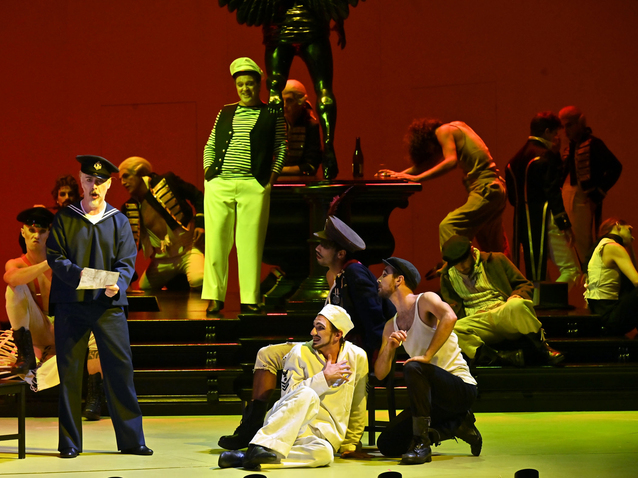 © Un Ballo in maschera - Gran Teatre del Liceu Barcelona (2024)
© Un Ballo in maschera - Gran Teatre del Liceu Barcelona (2024)
The high musical level reached in Un Ballo in maschera that in the last days has been offered at Liceu has managed to bring success to the performances, which otherwise in the strictly theatrical scope would have been a failure.
The main merit in the triumph of this Ballo must be attributed to maestro Riccardo Frizza, who managed to get the orchestra to offer one of the best performances of the season. Frizza got from the instrumental ensemble the relatively restrained, intimate and somewhat chamber-like sound that Verdi wanted for this opera. There were details of great sound quality and the dynamic balance between the orchestral pit and the stage was exemplary. The choice of subtly varying tempi was also successful.
In the vocal field, Neapolitan soprano Anna Pirozzi, one of the best interpreters of Amelia that can be found today, stood out. Pirozzi possesses an extraordinary and very complete instrument, ideal for Verdian singing. The center of the voice has body, thickness and weight and the projection is superb; she descends convincingly to the low range and rises to the treble with ease without changing colour and covering the sound very well. All this is accompanied by a perfect control of the breath that allows her an exact mastery of the dynamics.
The British-Italian Freddie De Tommaso, a tenor in ascending phase, made a very good Riccardo. The voice, lirico spinto, has an imposing and a slightly surprising presence because De Tomaso often sounds like an "old-time" tenor, those of the glorious generation of the mid-20th century, with a brilliant, full, splendid chest voice. In the transition to the upper register, the emission changes colour a bit, but the treble is clean and luminous. De Tomaso has not yet mastered the voice and the Verdian style, he makes some inadequate portamenti and in the third act appeared some emissions not sufficiently well controlled. Nevertheless, his performance was memorable and the future of this young singer is expected to be very bright.
Artur Ruciński is an intelligent baritone who knows when to make the winning bet. The voice, without being extraordinary, is very good, the singer managed it with prudence and offered it with generosity in the third act, when with "Eri tu" comes his big chance to shine. Ruciński wisely controlled the breath and closed his aria with a long, very long, interminable note, with a delicate messa di voce included that enraptured the audience.
Sara Blanch was an ideal Oscar, both for the beauty of her voice and the ease with which she sings agility and for her delightful stage presence.
Valeriano Lanchas and Luis López Navarro were very good in the roles of the sinister conspirators. Very good, too, was the performance of the choir, which in this production does not step on the stage and sings at all times from a raised platform that makes it invisible to the audience on the upper floors of the theatre.
The production, coming from the Teatro Regio di Parma, was signed by Jacopo Spirei who completed the initial project of Graham Vick who died, due to the covid, three months before the premiere.
Spirei's proposal certainly has a definite dramatic intention, but it is also certain that this intention does not reach the spectator at any time with clarity and effectiveness. In a very bare space where everyone is dressed in black and all the main scenic elements are black, the characters wander helplessly and aimlessly. Spirei uses the increasingly frequent strategy of, in order not to further complicate the already difficult work of the singers, adding to the production a bunch of mute characters and figurants who with their action more or less change the original plot and bring the meaning of the play to the director's desired terrain. This can be done well or badly. In this production it was not well done and that extravagantly choreographed ballet, all those extras going absurdly from one place to another and that unsuspected trapeze artist doing pirouettes, only managed to create an annoying, useless and unnecessary "stage noise" while the tenor died, thus ruining one of the moments traditionally most awaited by the operatic public.
Xavier Pujol
Barcelona, February 20, 2024
Un ballo in maschera by Giuseppe Verdi. Anna Pirozzi, soprano. Freddie De Tommaso, tenor. Artur Ruciński, baritone. Daniela Barcellona, soprano. Sara Blanch, soprano. David Oller, baritone. Valeriano Lanchas, bass. Luis López Navarro, bass. Orchestra of Gran Teatre del Liceu. Choir of Gran Teatre del Liceu. Riccardo Frizza, Conductor. Jacopo Spirei (after Graham Vick’s project), Stage director. Richard Hudson, Scenography and Costumes. Virginia Spallarossa, Choreography. Giuseppe di Iorio, Lighting. Production by Teatro Regio di Parma. Gran Teatre del Liceu.
the 22 of February, 2024 | Print

Comments